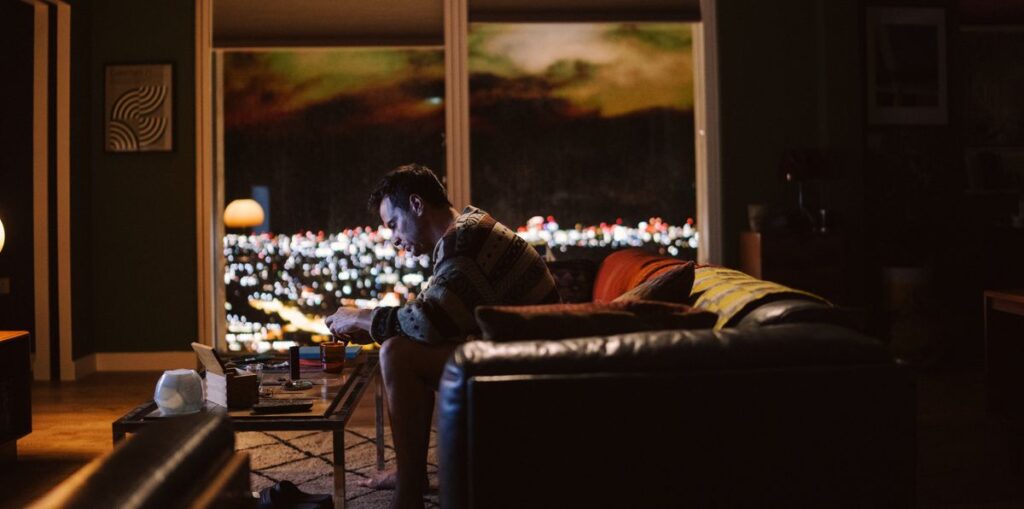Andrew Haigh’s dark love story All of Us Strangers arrived to Hulu on Feb. 22, after two quiet months of building up word of mouth in theaters. Debuting just before Christmas and competing with a lot of more bombastic releases, it initially reached a small audience — but it was evident that it made an impression, as critics and viewers spun out lengthy online analyses and discussions of its memorable, divisive ending.
Here at Polygon, we’re united in admiring the film, but we disagree about the impact of that ending — whether it’s necessary, fair to the characters, constructive to the film, you name it. And when we have strong disagreements on Polygon’s entertainment team, we send the case to Polygon Court, as we did when we debated the alternate ending of James Cameron’s Titanic, the most important part of the Fast and Furious franchise, the problem of Spider in Avatar: The Way of Water, and the song cut from The Muppet Christmas Carol, among other knotty pop culture cases.
In this case, we have divergent opinions on what the end of All of Us Strangers accomplishes. Polygon Court is now in session.
[Ed. note: End spoilers ahead for All of Us Strangers.]
The ending of All of Us Strangers
Image: Searchlight Pictures/Everett Collection
All of Us Strangers is a quiet love story about a lonely, isolated screenwriter, Adam (Andrew Scott), who returns to his childhood home while working on a script, and finds his parents there, even though they died when he was a child. Over the course of the movie, he gets some much-needed closure with these ghosts, but they also gently tell him that his relationship with them is holding him back, and they leave him behind in a tearful scene.
At the same time all this is going on, Adam meets a neighbor, Harry (Paul Mescal), seemingly the only other person already living in his high-rise apartment building. Harry shows up at Adam’s door drunk one night, seeking company. Adam, shy and awkward, shuts him out. Later, though, they reconnect, and launch an initially tentative, then passionate relationship. Adam eventually tries to introduce Harry to his ghost-parents, which goes poorly, and Harry flees. When Adam seeks him out, visiting Harry’s apartment for the first time, he finds that Harry is dead — and has been dead since the night of that first meeting, when Adam rebuffed him, and Harry returned to his own bed and overdosed.
In the movie’s final sequence, Adam accepts his lover as a ghost, comforts him, and curls up in bed with him. The camera slowly retreats, leaving them in darkness.
Opening statements: The power of love
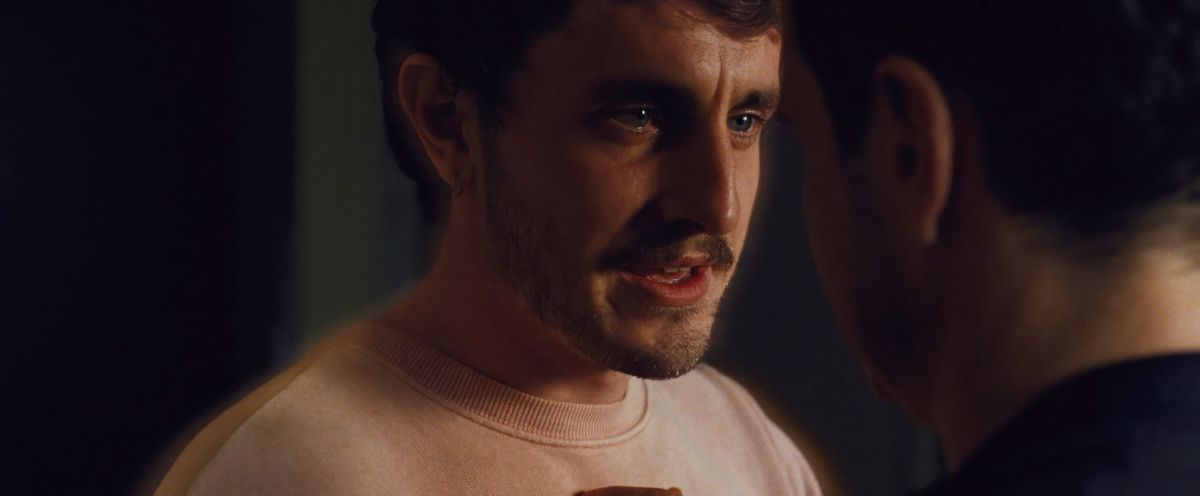
Image: Searchlight Pictures/Everett Collection
Tasha: Pete, the ending of All of Us Strangers had a powerful emotional effect on me. I found it stunning — the performances, the emotional tenor they bring to Adam and Harry’s relationship, the way the sequence pays off the themes that have been building throughout the movie, the use of Frankie Goes To Hollywood’s “The Power Of Love” both on the soundtrack and in the lyrics Adam quotes. I loved it! So I was shocked to find out it was your least favorite part of the movie. Sum it up for me: What was your reaction to it?
Pete: I found it bitter and disappointing. I absolutely loved the first 80-ish minutes of the movie, gorgeously shot and acted story about the lingering power of love and being loved. But the reveal at the end about Harry’s fate felt like a cheap narrative trick. It’s unnecessarily cruel, without adding much depth or impact to what was already an incredibly powerful story.
Presentation of evidence: Is the ending of All of Us Strangers justified?
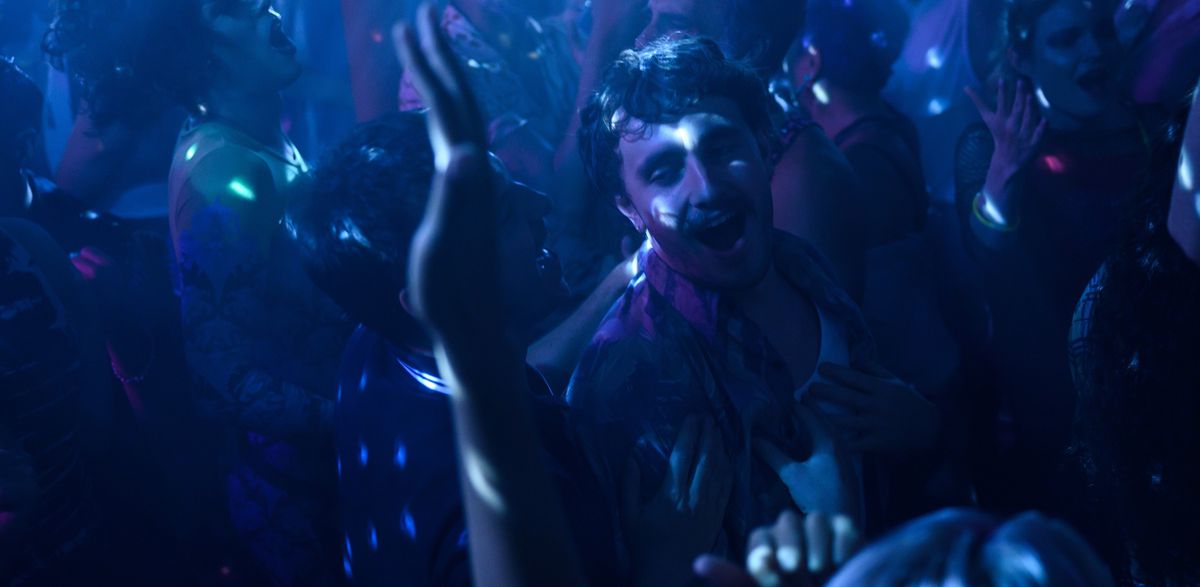
Image: Searchlight Pictures/Everett Collection
Tasha, the case for the ending: There’s a lot to unpack there, but the part that surprises me most is the idea that Harry’s death doesn’t add depth to the story. For me, the ending turns a fairly simple, straightforward “let go of the past, embrace the future” love story into something much more thematically complicated, where we have to consider the differences between Adam’s relationship with his parents and with Harry, and what each of them says about him.
If Adam’s relationship with his ghost-parents was holding him back, are we meant to see his relationship with his ghost-boyfriend in the same way? Is their embrace contradictory? Is it backsliding? Is it fundamentally different because he’s supporting someone who needs him, instead of the opposite? Adam didn’t create Harry’s addiction or depression, but does he bear any guilt or blame for what happened to Harry? Or is he just feeling the responsibility of taking care of someone he loves?
How are we meant to feel about this ending, and what it says about the movie’s themes and Adam’s state of mind? I’ve been weighing all these things ever since I first saw the movie months ago, and I guarantee that wouldn’t be true if it was just a simple tale of someone learning to move past his own past.
Pete, the case against: I think these are all incredibly interesting questions, and at the end of the day, what I’ve settled on is that this narrative choice wouldn’t have felt so jarring for me if it had been established early on. Instead, as a very late twist to what you’ve seen, it comes across to me as too enamored with its own cleverness and ultimately cruel to Adam, sentencing him to a lifetime of misery and loneliness. (And as you noted, bringing the question of guilt and blame into the situation.)
Yes, he “has” Harry in his life, but part of the joy of being in a romantic partnership is being able to share the love of your life with other people you care for — as Adam shows by “taking” Harry out to a bar and to his parents’ house. The reveal tells us how empty their life together will actually be.
Tasha, the case for the ending: I don’t see it the same way at all! It doesn’t seem like Adam has anyone in his life to introduce Harry to. The fact that they can go out to a bar and dance together proves that they aren’t limited to hiding in private, and going out with Harry frees Adam from cloistered isolation. Maybe they aren’t destined for sparkling dinner parties or group vacations with a crowd of friends, but there wasn’t any of that in Adam’s life before Harry came along, either. At least with Harry, he has someone.
I’m certainly not arguing that All of Us Strangers’ ending is a happy one: At absolute best, it’s bittersweet, and yes, pretty lonely. But within that tragic-romance space, there’s a melancholy power to the idea of finding someone you feel so connected to that you’re willing to give up the world for them if need be — and someone you love so much that your romance transcends death itself.
And I’d argue that there’s also a really significant power in a movie ending where what the audience feels about the protagonist’s situation and what the protagonist feels about it are radically different from each other. I’m thinking about the ending of one of my all-time favorite movies, Brazil, or more recently, Eternal Sunshine of the Spotless Mind. In both cases, the audience is left somewhere between saddened and horrified in spite of the characters’ happiness. I see something similar going on in this ending, and I respect it as a difficult but emotionally effective thing to pull off.
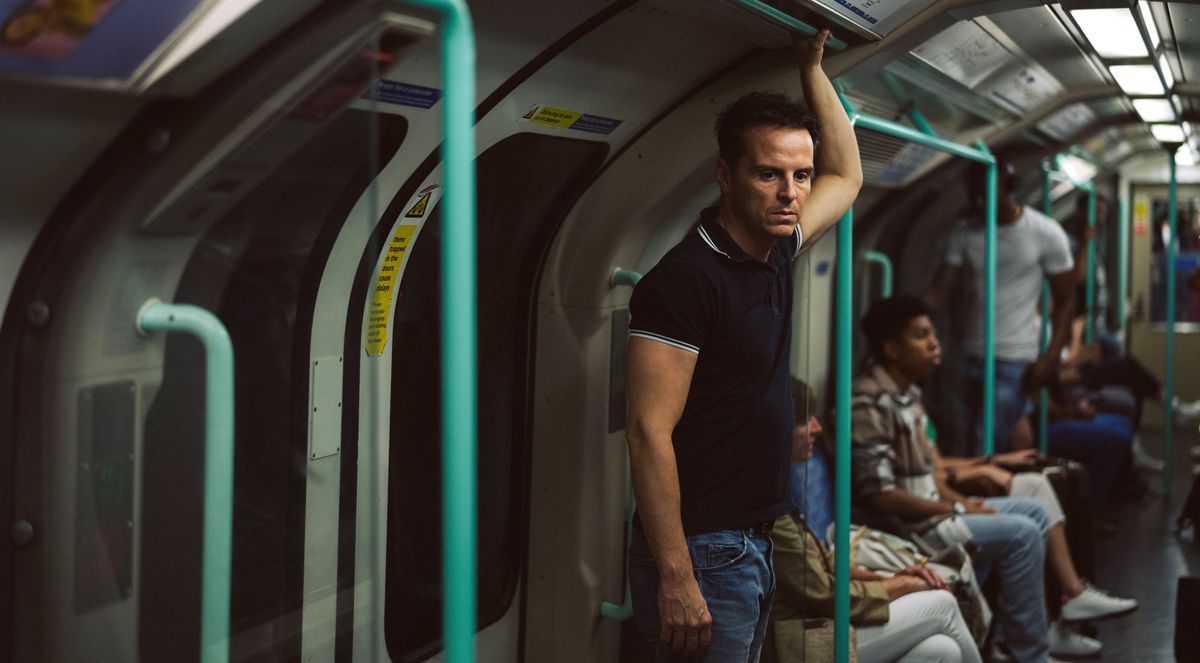
Image: Searchlight Pictures/Everett Collection
Pete, the case against: For me, part of the power of the movie is the fact that the questions you raised still linger meaningfully despite my distaste for the ending. It is contradictory, which is fascinating, and I think the movie frames Adam and Harry’s embrace as comfort, even if to me it is a very cold one. I’ll disagree with you on one main point: I think the movie would have been just as powerful for me had it only been about Adam moving on from his parents’ death and moving forward with Harry.
For me, that story still had so much to say about the enduring power of love (something Haigh has said he wanted to communicate with the film) and its ability to cross unfathomable, even metaphysical boundaries. Claire Foy and Jamie Bell’s uncontainable curiosity about their son’s life and interests hit me hard, and I felt his relationship with Harry was a wonderful counterbalance because of the generational gaps (big and small) throughout the movie, and the opportunity it presented for him to finally be happy.
Tasha, the case for the ending: But then how would Harry have interacted with that storyline at all? Would the narrative focus just been a simple choice between the living and the dead, the past and the present?
You said you would have preferred to know that Harry was dead earlier in the movie, but I don’t think that could have worked narratively. And the reason is what you just noted about Adam’s parents. I don’t think we could have processed Harry’s death or decided what to do with it until Adam’s arc with his parents was resolved. Their curiosity about Adam’s life and about their own deaths, their feelings about their ongoing relationship with Adam and what he needs in order to move forward — those are all priming us to understand how ghosts work in this world, and what a relationship with one would be like. (The details are pretty unique!)
Yes, I agree it plays as a “gotcha” kind of twist — not a gleeful one, but certainly a “You didn’t see this coming.” (I’ve thought a lot about whether there’s an argument to be made that All of Us Strangers is a stealth sequel to The Sixth Sense, which features a similar kind of ending twist, though in that world, the dead don’t know they’re dead.)
But I also think it needed to be the last thing that happens in the movie, because until Adam’s wrapped his arc with his parents, he’s still a man in transition. He has to make it through that experience in order to decide how to approach Harry based on everything he’s learned — and we the audience need his relationships with his parents and with Harry to be distinct from each other, related and intertwined, but still not just simple extensions of each other.
Pete, the case against: One thing I struggled with after finishing the film was concern that my distaste came out of a dislike of something bad happening to a character I liked. But then I watched Hirokazu Kore-eda’s new film Monster, a movie I love where plenty of bad things happen to characters I like (and that includes some clever twists!). That helped reaffirm where I was coming from here, despite how jumbled my feelings about All of Us Strangers are.
And my feelings continue to be jumbled as we talk about it — I find myself agreeing with a lot of what you’re saying, and the difficulty the movie would have had narratively if it hadn’t positioned Harry’s death as a twist. I do think it’s possible, and in my version, rather than a choice between the living or the dead, it would be the living and the dead — accepting both the permanence and consequences of death, as well as the opportunity of life in the new world he has for himself. As constructed, he does choose between the living and the dead, and the choice he makes is “the dead.” But I’ll push that hypothetical rewrite onto Andrew Haigh instead, and leave that up to him to figure out.
Ultimately what I’m grateful for is this isn’t one of those movies where I’m left completely bewildered by other people’s responses to it. I think there are a lot of excellent things about All of Us Strangers, and I’m incredibly glad that people are responding to it so positively, even if I didn’t all the way through.
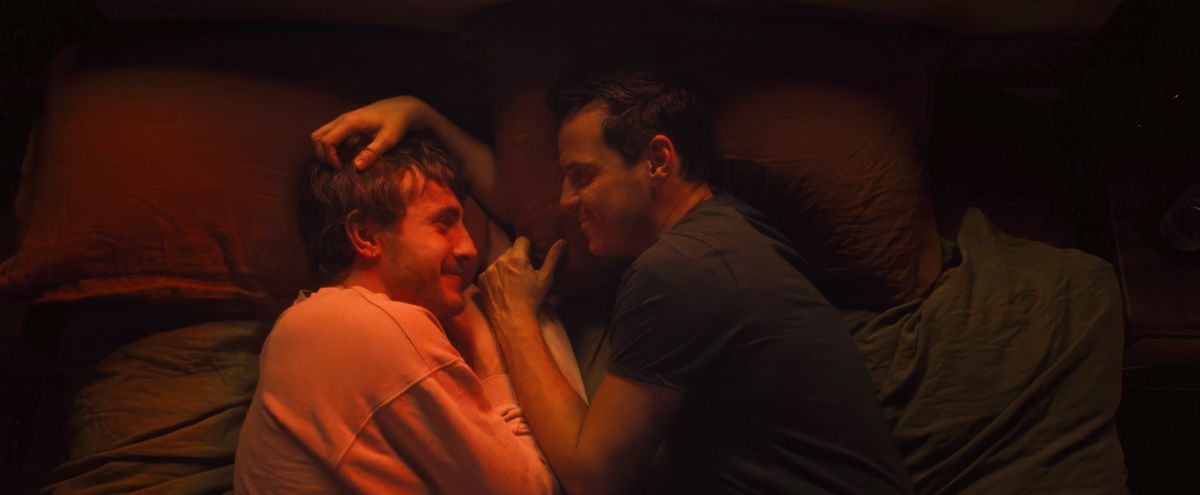
Image: Searchlight Pictures/Everett Collection
Tasha, the case for the ending: And I certainly understand your objections! The thing I’m left questioning the most about the movie is the narrative perversity of Adam having his dependence on two ghosts broken against his will, for his own good — and then turning around and emotionally committing to a third one.
That, and one more thing that does really give me pause: the way this movie unfortunately falls into the “bury your gays” trope. It’s a longstanding, well-noted issue that queer characters disproportionately suffer tragic symbolic endings, and it’s rare to see a queer couple get an uncompromised happy ending. I’m in favor of this specific movie ending, but I’m not entirely comfortable with how the movie fits into the cliché.
Looking into the source material here — the movie is a loose adaptation of Taichi Yamada’s 1987 Japanese novel Strangers — this ending is very much Haigh’s radical revision of a story involving a straight relationship, and a man plagued by predatory ghosts. The Harry equivalent, a woman named Kei, even reads as vengeful and angry about the Adam equivalent refusing her early in the story — a rejection that pushed her to take her own life by repeatedly stabbing herself. There’s no question that the Adam character needs to escape her before she kills him. It’s a remarkably different story all around, which means this version of the story — and the way it falls into that frustrating old trope — is entirely Haigh’s vision. Did that aspect bother you at all?
Pete, the case against: That’s very interesting, and I’m glad you brought that into the conversation. I was curious about the source material, but hadn’t taken the step to look closer into it yet.
And yes, I’d be lying if I said the litany of stories about gay love that end in tragedy didn’t play a role here. But I was less bothered by similar decisions in other 2023 queer films (examples redacted due to spoilers), so I feel confident saying it’s not just that.
Closing statements: What comes from darkness
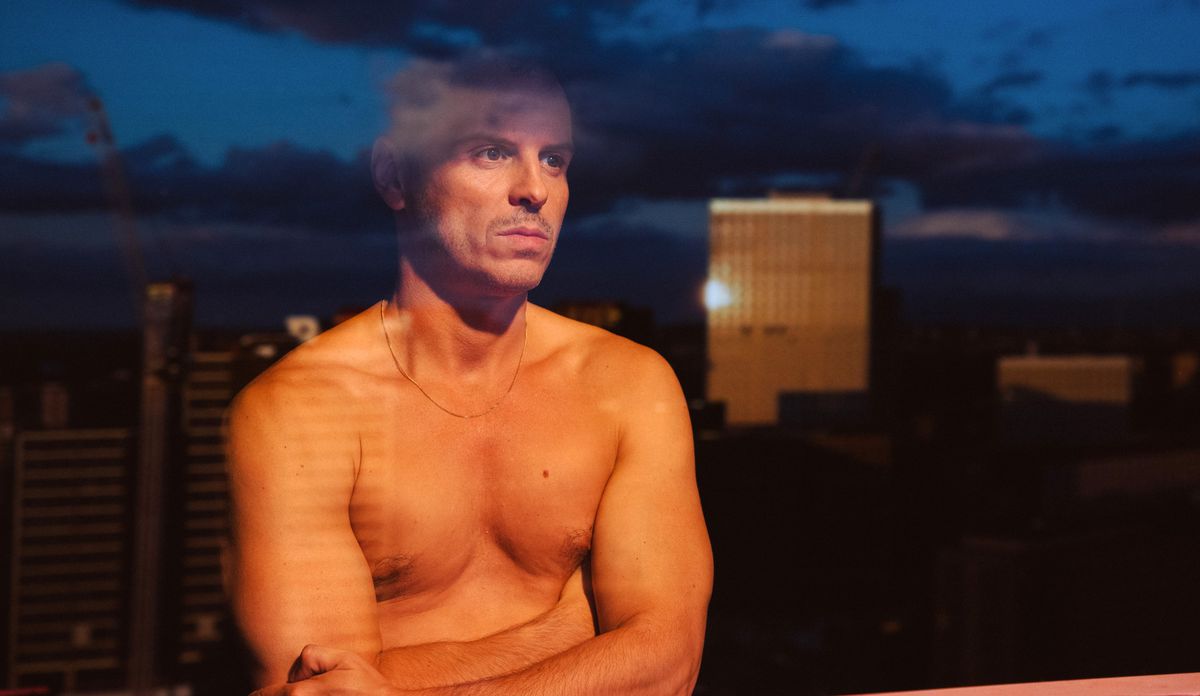
Image: Searchlight Pictures/Everett Collection
Tasha, the case for the ending: Ultimately, to me, the ending of All of Us Strangers is dark, sad, and strange, but none of those things are knocks against it — they come across as daring to me, and thoughtful. I suspect Haigh has clear answers in mind for the questions we’ve posed here, but he’s made it clear with his careful answers in interviews that he doesn’t want to give them away. He wants people to consider them for themselves, and come away from the film moved, engaged, and primed for a discussion. In that spirit, this ending absolutely worked for me.
Pete, the case against: I still have a lot of love for All of Us Strangers, and I’m truly glad that a beautiful, aching queer love story that has thorny elements and takes on difficult topics has been able to connect with audiences in such a strong way. I don’t have a perfect picture of what this movie looks like without the late twist, but as currently constructed, the ending just didn’t land for me, and left a sour taste in my mouth after what was otherwise a wonderful experience. And you know what? I’m okay with that.

